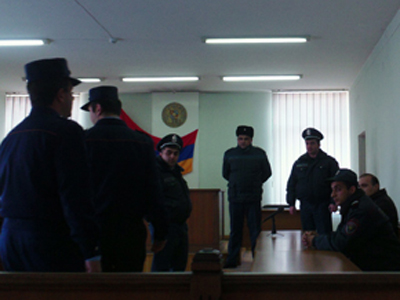The cases of domestic or family violence against women in Armenia keep recurring due to the inaction of law enforcement authorities; the prosecution builds the cases mainly on the testimony of husband defendants, while the courts subsequently subject them to disproportionate and mild sentences, according to a report published by the Coalition to Stop Violence against Women entitled “Discrimination against Women in Armenia’s Judicial System.”
Since 2010, the Coalition has been monitoring 8 court cases of domestic violence, including 3 murders, 2 cases of torture, 3 cases of beating, and one child abduction case. In almost all cases, the accused was the victim’s current or former spouse.
The report says that in the monitored cases, the alleged crimes were based on a subjective representation of the victim’s behavior: “was not a good mother,” “was immoral,” “was not a good wife; did not clean the house or prepare food.” Often, instead of comprehensively examining the criminal act, the courtroom was used to find justifications for these characteristics. “In other words, rather than to lawfully define, condemn and punish the offences, the court either did not deign to pay proper attention or approved these criminogenic stereotypes.”
As an example, the report brings up the trial over the stabbing murder of Heghine Darbazyan, in the course of which defendant Artak Arakelyan’s lawyer, calling into question Darbazyan’s character, asked the deceased woman’s minor son; “You’re a grown man; why couldn’t you have told your mother to […]?”

As regards the activities of law enforcement agencies, the report states that in all the monitored cases, law enforcement officials have failed to properly act on the victims’ previous complaints; “In almost all cases, the victims had earlier filed a report with the police, but proceedings were either not initiated or were discontinued because of a withdrawal of the complaint or a lack of a criminal intent.”
According to the report, judicial and preliminary investigation bodies apply double standards based on gender stereotyping, as evidenced by the case of Taguhi Mansuryan, who was attacked by her former husband with an axe in 2016. Having been subjected to beatings by her husband on multiple occasions, the woman went to the police several times, but the reports were not recorded. However, officials initiated criminal proceedings against the woman when the husband subsequently complained to the police that Taguhi had caused him a slight physical injury during an argument.

The authors add that in all cases, prosecutors built their cases solely around the testimony of the defendants, and the courts later took into account “mitigating circumstances” when issuing verdicts. For example, in the 2012 trial over the death of Diana Nahapetyan, who was knifed by her husband in the presence of their two minor daughters, the judge told the defendant that he would be set free in the courtroom if he managed to prove he had taken part in the [Nagorno-Karabakh] war.

“Participation in the protection of Armenia’s borders” also served as a mitigating circumstance for Lusine Ghabuzyan‘s physically abusive husband, who periodically subjected the woman to beatings in the course of their marriage.
In all the monitored cases, the report further states, the former or current spouses received grossly disproportionate and mild sentences: stabbing murder (21 times) – 3,5 years in prison; torture murder – 10 years; stabbing murder (30 times) – 11,5 years. The defendants in the two torture cases were granted clemency; while those accused of a beating were only fined AMD 50 and 150 thousand. In determining the sentences, the courts also failed to take into consideration the defendants’ criminal history, their motives, or the threat of a recurrence of a criminal behavior.
 Epress.am News from Armenia
Epress.am News from Armenia